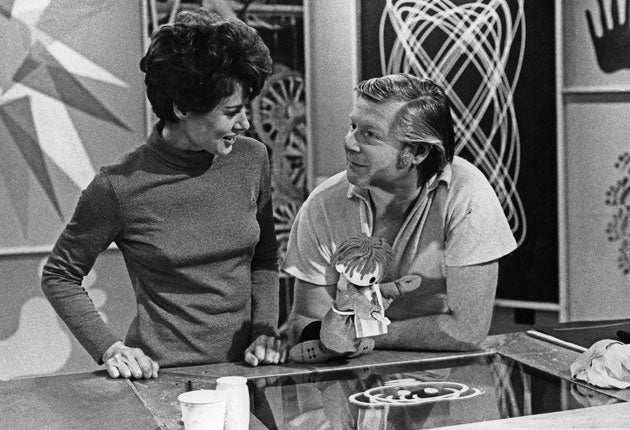Pat Keysell: Innovative signer who made her name presenting 'Vision On'

Your support helps us to tell the story
From reproductive rights to climate change to Big Tech, The Independent is on the ground when the story is developing. Whether it's investigating the financials of Elon Musk's pro-Trump PAC or producing our latest documentary, 'The A Word', which shines a light on the American women fighting for reproductive rights, we know how important it is to parse out the facts from the messaging.
At such a critical moment in US history, we need reporters on the ground. Your donation allows us to keep sending journalists to speak to both sides of the story.
The Independent is trusted by Americans across the entire political spectrum. And unlike many other quality news outlets, we choose not to lock Americans out of our reporting and analysis with paywalls. We believe quality journalism should be available to everyone, paid for by those who can afford it.
Your support makes all the difference.At the height of public-service broadcasting in Britain, Pat Keysell introduced a generation of deaf and hard-of-hearing children to television in Vision On, the first programme successfully to bridge the gap between those groups and hearing viewers. The innovative presenter, who had studied mime at drama school, combined sign language and speech in a show that originally featured magicians, jugglers and mime artists.
Vision On was screened fortnightly when it began in 1964. In the same year, the new, "minority" channel BBC2 launched News Review, the world's first news programme for deaf people, presented by Robert Dougall, but Vision On was targeted at a mainstream children's audience on BBC1. Deaf children put on plays in the studio, stories were told in mime and there was a quiz for both hearing and deaf viewers.
However, Vision On was soon reduced to monthly broadcasts amid discussions about such a "worthy" show's place in the schedules. It was saved with a revamp in 1966 that saw the quickfire artist Tony Hart bring a new vitality to the programme, which also introduced quirky animation.
Children's own artwork was showcased in The Gallery, mounted on a wall, with the camera panning across it, accompanied by a soothing, hypnotic jazz tune. Keysell will long be remembered for telling viewers: "I'm sorry we can't return any of your pictures, but we give a small prize for those that we show."
Hart and Keysell had both appeared in a previous show, For Deaf Children, but Vision On was firmly aimed at both hearing and non-hearing children. It ended in 1976, after 182 episodes, and Hart went on to present his own programmes while Keysell continued to work with the deaf and other disadvantaged people.
Born in Tooting, south London, in 1926, the daughter of an accountant, Keysell was brought up in Petts Wood, Kent, and studied mime at the Central School of Speech and Drama.
After joining the BBC's administration department in 1958, she became personal assistant to the assistant head of children's programmes, Ursula Eason, who was hard of hearing herself and had launched For Deaf Children in 1952. A new producer saw Keysell hanging around the show's set, liked her smile and made her its presenter (1960-64). Her previous performing arts interests also led her to found The Mime Group company of deaf actors, with which she performed in the programme.
After turning freelance to present Vision On – which won the Prix Jeunesse in 1972 and a Bafta Award as Best Specialised Series two years later – Keysell also taught mime for the Royal National Institute for the Deaf. In 1968, she travelled to the United States to study with the Royal National Theatre of the Deaf and, on her return, founded the British Theatre of the Deaf, which was a pioneer in performing for both deaf and hearing audiences.
Keysell ended her association with the theatre group in 1977, a year after Vision On was axed, but continued to pursue her interests in mime and the stage. For ITV she adapted and produced Under the Same Sun (1978-80), two series of folk tales from around the world based on a British Theatre of the Deaf show, and she was the author of Motives for Mime (1975), Mime Themes and Motifs (1980) and Mime Over Matter (1990).
She also worked at the Brewery Arts Centre, in Kendal, and toured her Compass Storytelling show. On moving to Eastbourne in 1996, she established Compass Community Arts, which promotes the arts for disadvantaged people, and its Round Robin Theatre Company, staging mainly non-verbal productions. In 2006, Keysell retired to Italy.
Anthony Hayward
Patricia Keysell, television presenter, writer and teacher: born London 7 June 1926; married (divorced; one son); died 31 October 2009.
Join our commenting forum
Join thought-provoking conversations, follow other Independent readers and see their replies
Comments